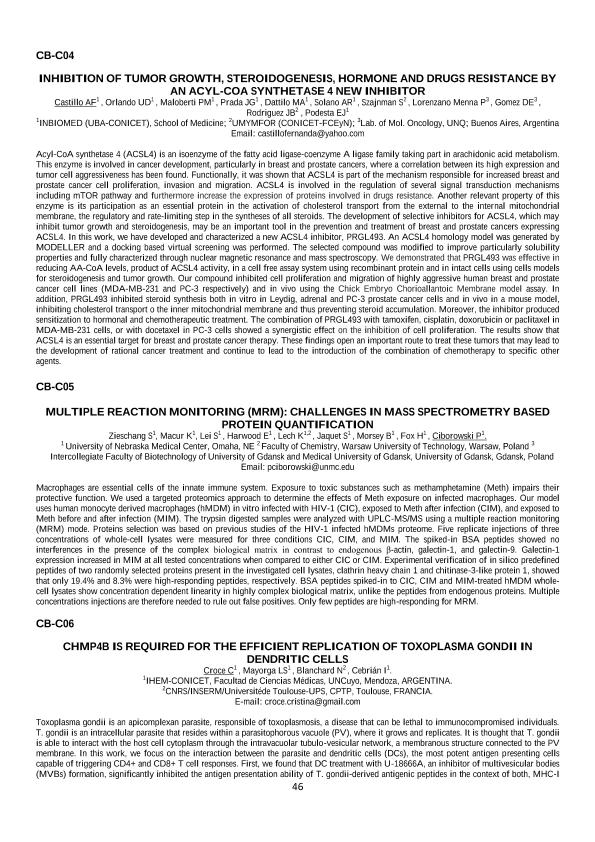Evento
CHMP4B is required for the efficient replication of toxoplasma gondii in dendritic cells
Colaboradores:
Burgos, Mario; Piezzi, Ramon Salvador

Tipo del evento:
Reunión
Nombre del evento:
LV Reunión Anual Sociedad Argentina de Bioquímica y Biología Molecular; XIV Congreso de la Asociación Panamericana de Bioquímica y Biología Molecular
Fecha del evento:
05/11/2019
Institución Organizadora:
Sociedad Argentina de Investigaciones en Bioquímica y Biología Molecular;
Asociación Panamericana de Bioquímica y Biología Molecular;
Título de la revista:
Biocell
Editorial:
Tech Science Press
ISSN:
0327-9545
e-ISSN:
1667-5746
Idioma:
Inglés
Clasificación temática:
Resumen
Toxoplasma gondii is an apicomplexan parasite, responsible of toxoplasmosis, a disease that can be lethal to immunocompromised individuals. T. gondii is an intracellular parasite that resides within a parasitophorous vacuole (PV), where it grows and replicates. It is thought that T. gondii is able to interact with the host cell cytoplasm through the intravacuolar tubulo-vesicular network, a membranous structure connected to the PV membrane. In this work, we focus on the interaction between the parasite and dendritic cells (DCs), the most potent antigen presenting cells capable of triggering CD4+ and CD8+ T cell responses. First, we found that DC treatment with U-18666A, an inhibitor of multivesicular bodies (MVBs) formation, significantly inhibited the antigen presentation ability of T. gondii-derived antigenic peptides in the context of both, MHC-I and MHC-II molecules. Nevertheless, the treatment with this drug did not affect the infection rate of DCs. By indirect immunofluorescence and confocal microscopy, we observed a clear recruitment of different MVB components to the PV, although most strongly the protein CHMP4b, core of the ESCRT III complex. In addition, upon DC infection by T. gondii, we evidenced a complete redistribution of CHMP4b around the PV and an over-expression of this protein, as compared to uninfected DC. Indeed, by Western blot analysis we confirmed a gradual increase in CHMP4b expression along the progression of T. gondii infection, suggesting a critical demand for CHMP4b by the parasite. To test this possibility, we silenced CHMP4b expression in DCs and analyzed the proliferation of a fluorescent T. gondii strain. Accordingly to our hypothesis, we found that the parasite is not able to replicate correctly in DCs after CHMP4b depletion, especially at later time points post-infection. Given the major role of CHMP4b in the formation of intraluminal vesicles, we think that it might be necessary for the adequate development of the T. gondii intravacuolar tubulo-vesicular network. Ongoing electron microscopy-based experiments in this direction will allow as to determine the relevance of CHMP4b during the formation of these intravacuolar structures.
Palabras clave:
TOXOPLASMA GONDII
,
CHAMP4B
,
DENDRITIC CELLS
,
PARASITOPHOROUS VACUOLE
Archivos asociados
Licencia
Identificadores
Colecciones
Eventos(IHEM)
Eventos de INST. HISTOLOGIA Y EMBRIOLOGIA DE MEND DR.M.BURGOS
Eventos de INST. HISTOLOGIA Y EMBRIOLOGIA DE MEND DR.M.BURGOS
Citación
CHMP4B is required for the efficient replication of toxoplasma gondii in dendritic cells; LV Reunión Anual Sociedad Argentina de Bioquímica y Biología Molecular; XIV Congreso de la Asociación Panamericana de Bioquímica y Biología Molecular; Salta; Argentina; 2019; 46-47
Compartir



